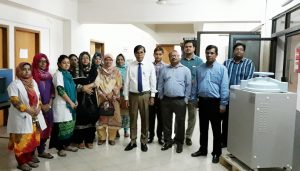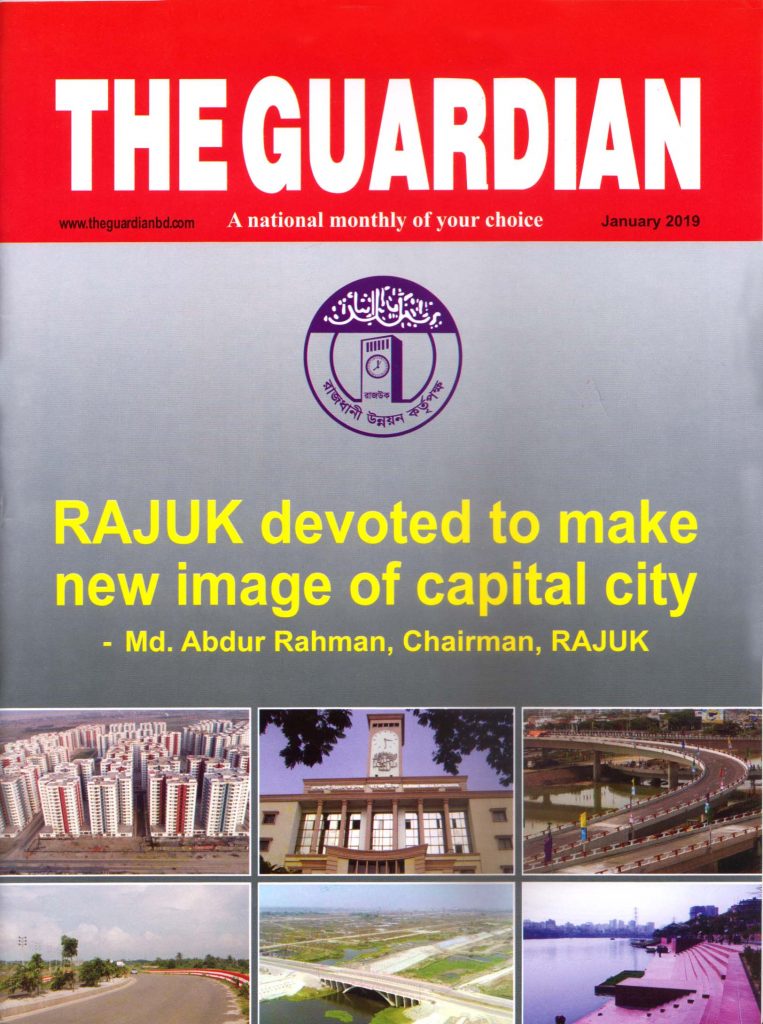The Department of Microbiology was separated from Pathology Department in 1992 and then started running independently. Doctors who previously worked as head of the microbiology department are (1) Professor Dr. Ruhul Hasin (late), (2) Professor Dr. Naima Muazzam, (3) Professor Dr. Kazi Zulfiqer Mamun, and (4) Professor Dr. KM Shahidul Islam.
Present faculty members
At present one professor (Dr. S.M. Shamsuzzaman), one associate professor (Dr. Shahin Ara Begum), two assistant professors (Dr. Md. Mizanur Rahman and Dr. Sultana Shajeda Nahar) and 9 lecturers (Dr. Akhtaruzzaman Choudhury, Dr. Md. Jobayer, Dr. Zeenat Afroz, Dr. Nasreen Farhana, Dr. Nadira Akter, Dr. Mahbuba Chowdhury, Dr. Faizur Rahman, Dr. Asif Rashed, Dr. Naomee Shareef) are engaged in teaching more than 400 undergraduate (3rd year and 4th year MBBS) students as well as doctors of post graduate courses like MD, MS, M.Phil. and diploma of different disciplines.
Besides, about 200 medical technologists get hands on training in microbiology from this department each year and teachers are also engaged in teaching diploma and graduate students of nursing institute which is situated in the DMCH campus. Microbiology Department is also a centre for FCPS part 2 examination.
As the sanctioned posts are not sufficient to provide quality teaching of such a large number of students of different strata, the authority has posted additional one associate professor (Dr. Sazzad Bin Shahid), three lecturers (Dr. Faiza Mukarrama, Dr. Abdullah Arafat, and Dr. Kakoli Halder) on attachment basis.
Offering M.Phil. degree
The Department of Microbiology of DMC is running a postgraduate course of Master of Philosophy (M.Phil.) in medical microbiology for the last 16 years and until April 2018, total 101 doctors got admitted in M.Phil. (Microbiology) course and 77 have obtained M.Phil. degree from this department. Of the doctors who got M.Phil. degree from this department, Dr. Rehena Khatun and Dr. Nurjahan Begum received Prime Minister’s Gold Medal Award in 2014 and 2015 respectively for being best scorer in preclinical and paraclinical subjects.
Journal club, clinical meeting and CME presentation
All the teachers of Microbiology Department and doctors of M.Mhil. microbiology course are engaged in Saturday and Tuesday journal club organized by the Microbiology Department where recent developments in medical microbiology are presented and discussed. Besides, scientific topics are presented in clinical meeting in presence of all professors, doctors and senior students and centrally selected topics are also presented in the Centre for Medical Education (CME).
Daily activities
Routine culture and sensitivity of different clinical samples are done as advised by the physicians of DMCH. Examination of body fluids, urethral discharge, prostatic fluid, sputum, endotracheal aspirates and analysis of semen are done. Blood culture is done using both conventional broth culture and automated blood culture method. Vaginal swab are examined for routine as well as forensic purposes. Besides, diagnosis of fungal diseases and parasitic diseases are done. Different serological tests are done for diagnosis of parasitic (kala-azar, filariasis, malaria) and bacterial (typhoid and paratyphoid, syphilis) diseases. In addition, some immunological tests like CRP, RA, pregnancy test as well as routine analysis of urine and stool are also performed.
For tuberculosis
Microscoy, tuberculin test and PCR are being done for diagnosis of pulmonary and extrapulmonary tuberculosis. Recently, for diagnosis of multidrug resistant tuberculosis (MDR-TB), Gene Xpert machine has been set up and is running.
Research activities
A good number of research have been done by the M.Phil. thesis part students and teachers of Microbiology Department, most of which are very innovative. The objectives of research are to detect causative agents of bacterial, fungal and parasitic diseases and to find out the mechanism of antibiotic resistance for bacteria to different antibiotics including the newer ones such as carbapenems, colistin and tigecycline, vancomycin, linezolid etc. Many bacteria isolated from patients of DMCH are resistant to most and in some cases all available antibiotics. To find out treatment options for these multidrug and pan drug resistant organisms, invitro (in artificial media) and invivo (rat and mouse model) test of combination antibiotic therapy has been done and are going on.
Molecular biology lab has been set up in the Department of Microbiology of DMC in 2008 and is running in full swing. Until now 60 doctors have learnt the basic molecular biology techniques including detection of different virulence genes and drug resistant genes by polymerase chain reaction (PCR), DNA sequencing and Restriction fragment length polymorphism (RFLP) including detection of different nonculturable (Chlamydia) or difficult to culture in routine media (such as anaerobic bacteria, Mycoplasma, Ureaplasma, Neisseria, Haemo-phylus, Mycobacteria etc.) from clinical samples. Research in developing vaccine against invasive bacterial diseases are in progress. The doctors who completed thesis learn how to run a molecular biology lab and a few have gone abroad for higher studies.
Helps in manpower export Microbiology Department of DMC plays an important role in medical testing of the job seekers selected to travel Malaysia under government to government (G2G) project organized by ministry of labor and employment and Director General of Health Services.
Producing teachers and researchers
Every year 10 students get admitted in M.Phil. course in the Department of Microbiology of DMC. After getting M.Phil. degree they are working in different government and private medical colleges as teachers and contributing quality teaching to produce quality doctors and some of them are working as researcher in icddr,b and abroad.
Microbiology Department is serving the nation by producing quality doctors and expert microbiologists by providing quality education and thus it helps in proper management of the patients and reduce antimicrobial resistance.
Profile of Prof. Shamsuzzaman
Professor Dr. S.M. Shamsuzzaman, son of S.M. Solaiman and Johora Khatun (late) was born in 1962 at the village of Maria under the upazila of Bagmara in Rajshahi district.
Academic qualifications
He passesd SSC (1978) from Gobindopara High School located in Bagmara upazila of Rajshahi district; HSC (1980) from Rajshahi College, Rajshahi; MBBS (1986) from Rajshahi Medical College; M.Phil. (1995) in Medical Microbiology from the Institute of Post Graduate Medicine & Research (IPGMR), now Bangabandhu Sheikh Mujib Medical University (BSMMU), Dhaka; Ph.D. (2002) from Kochi Medical School of Japan and studied bioinformatics in the international center for genetic engineering and biotechnology (ICGEB), New Delhi, India. During study in Japan, he carried out research on leishmaniasis using molecular techniques like PCR, sequencing, cloning as well as western blot, flow cytometry and electron microscopy. In addition to clinical samples, both invitro and invivo experiments using rabbits, golden hamster and BALBc mice were done.
Research activities
Professor Shamsuzzaman worked on amoebiasis, leishmaniasis and clinical microbiology. He has published more than 80 articles in different international and national journals and has been awarded Who’s Who Award in 2004. Under his supervision, PCR lab was established in the Microbiology Department of Sir Salimullah Medical College and molecular biology lab has been established in the Department of Microbiology of Dhaka Medical College.
Service profile
Professor Shamsuzzaman joined the Bangladesh Civil Service in health cadre as assistant surgeon in December, 1989 (8th BCS). After obtaining M.Phil. degree he joined the Department of Microbiology of DMC as a lecturer in March, 1995 and joined Faridpur Medical College as assistant Professor of Microbiology in 1997. In October 1997, he went to Kochi Medical School of Japan with Monbusho Scholarship and obtained PhD degree. After coming back he worked at IEDCR, Mohakhali, Dhaka as Principal Scientific Officer and Sir Salimullah Medical College as Assistant Professor of Microbiology. In addition, at present Professor Shamsuzzaman is working as Chairman, Ethical Review Committee of Dhaka Medical College, Member, Ethical Review Committee of icddr,b; Dhaka, external examiner of Ph.D. thesis.












